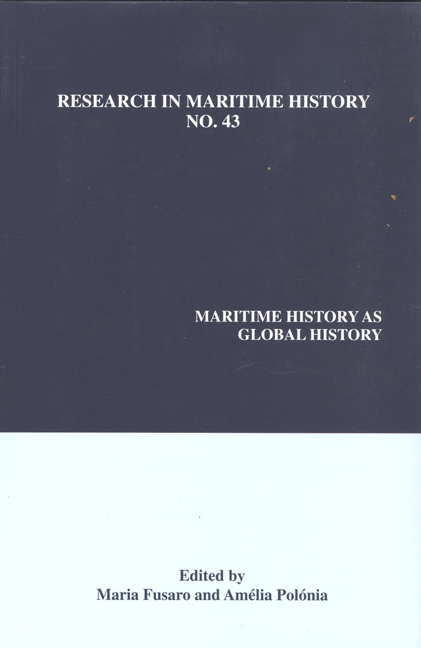Book contents
- Frontmatter
- Contents
- About the Editors
- Contributors' Notes
- “Maritime History: A Gateway to Global History?”
- “Behind the Atlantic Expansion: Flemish Trade Connections of Seville in 1620”
- “National and International Labour Markets for Sailors in European, Atlantic and Asian Waters, 1600-1850”
- “Maritime Expansion and (De)globalization? An Examination of the Land and Sea Trade in Seventeenth-Century Mughal India”
- “From Hold to Foredeck: Slave Professions in the Maritime World of the East India Company, c. 1660-1720”
- “Small Town Merchants, Global Ventures: The Maritime Trade of the New Julfan Armenians in the Seventeenth and Eighteenth Centuries”
- “Lighting up the World? Empires and Islanders in the Pacific Whaling Industry, 1790-1860”
- “Technological Advances in the Maritime Sector: Some Implications for Trade, Modernization and the Process of Globalization in the Nineteenth Century”
- “Lost in Calculation? Norwegian Merchant Shipping in Asia, 1870-1914”
- “Why Are the Major Oil Companies Selling Off their Fleets? The Case of Total”
- “Turning Maritime History into Global History: Some Conclusions from the Impact of Globalization in Early Modern Spain”
- “Maritime History as Global History? The Methodological Challenges and a Future Research Agenda”
“Maritime Expansion and (De)globalization? An Examination of the Land and Sea Trade in Seventeenth-Century Mughal India”
- Frontmatter
- Contents
- About the Editors
- Contributors' Notes
- “Maritime History: A Gateway to Global History?”
- “Behind the Atlantic Expansion: Flemish Trade Connections of Seville in 1620”
- “National and International Labour Markets for Sailors in European, Atlantic and Asian Waters, 1600-1850”
- “Maritime Expansion and (De)globalization? An Examination of the Land and Sea Trade in Seventeenth-Century Mughal India”
- “From Hold to Foredeck: Slave Professions in the Maritime World of the East India Company, c. 1660-1720”
- “Small Town Merchants, Global Ventures: The Maritime Trade of the New Julfan Armenians in the Seventeenth and Eighteenth Centuries”
- “Lighting up the World? Empires and Islanders in the Pacific Whaling Industry, 1790-1860”
- “Technological Advances in the Maritime Sector: Some Implications for Trade, Modernization and the Process of Globalization in the Nineteenth Century”
- “Lost in Calculation? Norwegian Merchant Shipping in Asia, 1870-1914”
- “Why Are the Major Oil Companies Selling Off their Fleets? The Case of Total”
- “Turning Maritime History into Global History: Some Conclusions from the Impact of Globalization in Early Modern Spain”
- “Maritime History as Global History? The Methodological Challenges and a Future Research Agenda”
Summary
Introduction
Maritime studies have been rejuvenated by the ascendant school of global history which is broadly interested in economic, institutional, technological and cultural connections and interactions – the extension and intensification of which can be called globalization – and which sees maritime spaces as conduits for such processes (e.g., the extension of commodity markets, the basis upon which shipping and navigational technologies and institutions are necessarily developed, exchanged or extended, and the place in which cultural interactions take place). Indeed, global historians have positioned maritime spaces centrally in what has been called “global re-convergence,” the process by which the people and spaces of Pangaea have been reconnected. The oceans and seas were crucial to local, regional (e.g., within the Indian Ocean or the Mediterranean) and then global integration. Yet whether maritime history is global history, as opposed to merely an important focus for processes which interest global historians, and whether these two perspectives are fully complimentary in the areas where they overlap, are issues of immense importance.
Moreover, there is the issue of whether maritime spaces unequivocally contributed to this process of re-convergence or globalization. Practically, global and maritime history macro-narratives, no matter how detailed, cannot pay attention to the important ambiguities, local/regional diversity and variety of experiences without the analysis of micro- or meso-histories. Empirically, there is the question of whether the expansion of maritime trade competed with or complemented often long-established land trade, and consequently whether maritime expansion was as pro-globalizing as has been alleged. The Indo-Central Asian trade is of relevance here (see figure 1). On the one hand, it is in the period after Vasco da Gama's landing in India in 1498 that European maritime expansion in Asia occurred, so that by the early seventeenth century the Dutch (1606) and the English (1607) had established their first trading posts in an attempt to wrest control of the profitable spice trade from the Portuguese, with the effect of accelerating global re-convergence. On the other hand, the Indian sub-continent had been connected to the fringes of Europe, the Near East and Central Asia (as well as East and Southeast Asia) for several millennia before 1498; the land-based contacts via Central Asia were established approximately 2000 years previously, while the first maritime contacts took place between 3000 and 5000 years earlier.
- Type
- Chapter
- Information
- Maritime History as Global History , pp. 73 - 94Publisher: Liverpool University PressPrint publication year: 2010



